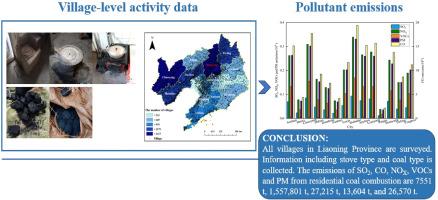村级居民燃煤排放清单及减排分析:中国辽宁省案例研究
IF 16.3
1区 工程技术
Q1 ENERGY & FUELS
引用次数: 0
摘要
在中国东北地区,农村地区是居民燃煤控制政策的重要实施主体。然而,由于数据的可获得性,辽宁省的居民燃煤排放清单尚未建立。为填补这一空白,基于辽宁省所有村庄的调查数据,编制了 2020 年村级二氧化硫、一氧化碳、氮氧化物、挥发性有机物和可吸入颗粒物排放清单。根据这些数据,设定了三种情景来分析减排效果。结果表明,居民煤炭消费量为 686.84 万吨,其中烟煤占 85%,主要集中在农村地区。其中,环保炉具的 CO(30.47%)和 PM(9.98%)污染物减排量最大。2020 年燃煤供暖在时间上主要集中在 11 月至 12 月和 1 月至 3 月,这两个月份的总份额为 85.82%。污染物排放在空间上集中在辽阳、鞍山、营口、葫芦岛、朝阳、本溪和阜新市。在三种方案中,"全替代+增加可再生能源比例 "方案的减排效果最好。这些结果可为空气质量模型提供准确数据,为辽宁省的污染控制策略提供科学支持。本文章由计算机程序翻译,如有差异,请以英文原文为准。

Village-level emission inventory of residential coal combustion and reduction analysis: A case study of Liaoning Province, China
In Northeast China, rural areas are important entities of residential coal control policies. However, due to the availability of data, the residential coal emission inventory in Liaoning Province has not yet been established. To fill the gap, based on the survey data of all villages in Liaoning Province, a village-level emission inventory of SO2, CO, NOX, VOCs, and PM in 2020 was compiled. Based on these data, three scenarios were set up to analyze the effect of emission reduction. The results indicated that residential coal consumption was 6.8684 Mt, with bituminous coal accounting for 85 %, mainly in rural areas. The emissions of SO2, CO, NOX, VOCs and PM from residential coal combustion were 7551 t, 1,557,801 t, 27,215 t, 13,604 t, and 26,570 t. Among them, the eco-friendly stoves provided the most emission reduction in terms of CO (30.47 %) and PM (9.98 %) pollutant emissions. Coal-fired heating was temporally concentrated in November to December and January to March in 2020, with a total share of 85.82 % in those months. Pollutant emissions were spatially concentrated in the cities of Liaoyang, Anshan, Yingkou, Huludao, Chaoyang, Benxi and Fuxin. Among the three scenarios, the scenario of “Total substitution + increasing share of renewable energy” had the best emission reduction effect. These results can provide accurate data for air quality models and provide scientific support for pollution control strategies in Liaoning Province.
求助全文
通过发布文献求助,成功后即可免费获取论文全文。
去求助
来源期刊

Renewable and Sustainable Energy Reviews
工程技术-能源与燃料
CiteScore
31.20
自引率
5.70%
发文量
1055
审稿时长
62 days
期刊介绍:
The mission of Renewable and Sustainable Energy Reviews is to disseminate the most compelling and pertinent critical insights in renewable and sustainable energy, fostering collaboration among the research community, private sector, and policy and decision makers. The journal aims to exchange challenges, solutions, innovative concepts, and technologies, contributing to sustainable development, the transition to a low-carbon future, and the attainment of emissions targets outlined by the United Nations Framework Convention on Climate Change.
Renewable and Sustainable Energy Reviews publishes a diverse range of content, including review papers, original research, case studies, and analyses of new technologies, all featuring a substantial review component such as critique, comparison, or analysis. Introducing a distinctive paper type, Expert Insights, the journal presents commissioned mini-reviews authored by field leaders, addressing topics of significant interest. Case studies undergo consideration only if they showcase the work's applicability to other regions or contribute valuable insights to the broader field of renewable and sustainable energy. Notably, a bibliographic or literature review lacking critical analysis is deemed unsuitable for publication.
 求助内容:
求助内容: 应助结果提醒方式:
应助结果提醒方式:


